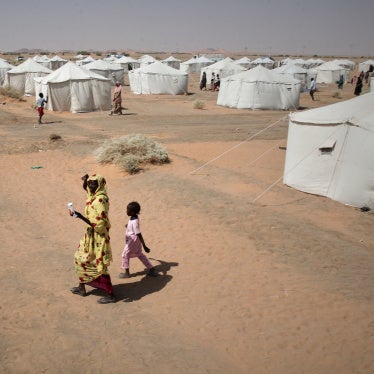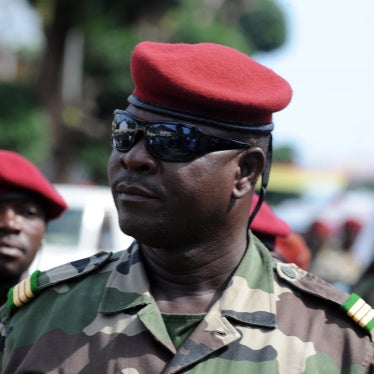Last fall, in a town about 60 miles northeast of the capital of Sierra Leone, I stood in a crowd of cheering members of the Revolutionary United Front and watched as their leader, Foday Sankoh, took the podium.
Under Sankoh's leadership, the RUF had conducted an exceptionally brutal offensive against government troops and civilians. But a peace accord signed by the government and rebels in July 1999 gave Sankoh and his forces a full amnesty for the crimes they'd committed in the eight-year war.
Sankoh was detained last month in Freetown, and the Sierra Leone government now says it intends to prosecute him for illegal diamond trading and for the deaths of 21 demonstrators outside his residence last month. But on that day in October, Sankoh sat placidly on stage (in a pair of lizard-skin shoes) with the military commander of the United Nations in Sierra Leone, and knew that the Nigerian peacekeepers scattered around the room in their camouflage uniforms would not, could not, lay a finger on him.
Christian and Muslim prayers were said. A handful of Sierra Leonean reporters sat in the second row, pencils at the ready. Finally Sankoh took the podium, and the crowd went wild.
"My brothers," he began. He reached out his hands and made a gesture of wiping, stroking each palm over the back of the other hand. "You have nothing."
His meaning, to the assembled band of RUF thugs, could not have been clearer: They were getting off scot-free for all the atrocities they had committed. In a country where hands have extraordinary symbolism - where the signature human rights abuse of the rebel force was, in fact, the amputation of hands - Sankoh's gesture was flabbergasting. Behind me I could hear our translator, who had narrowly escaped being murdered by the RUF in its January 1999 offensive against Freetown, gasp and whisper, "Oh, my God."
We had spent the morning interviewing the war's latest victims. We visited a tiny village deep in the bush, where the residents no longer slept in their homes because they were so afraid of rebel raids at night. Many of their children had been abducted, and several women had been raped. Then there was the young man we found at a dusty clinic just a couple of miles from where Sankoh was holding his rally. His neck and shoulders and spine were covered with tiny, deep burns inflicted by the rebels after he refused to give them money. "We're planting rice," the rebel soldier had said as he plucked a plastic bottle from a campfire and methodically dripped searing plastic over the man's naked back. The victim was lucky to be alive.
The U.N. dignitaries on the podium behind Sankoh remained expressionless during the rebel leader's little speech. Perhaps beneath their poker faces, their stomachs were churning with the same indignation and fury that I felt. But the moment stays fixed in my memory because it so neatly encapsulated the indefensible listlessness of the international community in the face of Sankoh's crimes.
The United Nations did not sanction the amnesty included in the 1999 accord. But the peace agreement was reached under U.N. auspices, and the British and the Americans were its chief architects. We at Human Rights Watch, who denounced the amnesty and warned that the peace accord would fail if the RUF were not brought to justice, were considered impractical spoilers. All sides, it was said, were eager for the war to end, on virtually any terms.
Rather suddenly, a consensus seems to have developed that Foday Sankoh is a war criminal who should be excluded from power. But now that he's in custody, what should be done with him? Sierra Leone's judicial system, after years of civil war, doesn't have the capacity to prosecute Sankoh. The authorities in Freetown have produced a curiously anemic list of charges against him, probably because some of the military figures currently allied with the government deserve to be prosecuted too.
Some observers have suggested a West African regional court to prosecute Sankoh. Others have proposed a hybrid tribunal with local and international judicial experts. It's essential that any tribunal have the resources and legitimacy to mount a strong prosecution.
In the longer run, there's obviously only one solution for Sankoh's ilk: a permanent international criminal court. The good news is that most countries in the world support the treaty setting up such a tribunal, and 97 have already signed it. The bad news is that the United States is still fighting a rearguard action to make the court weaker, out of a fear it might try to prosecute American citizens.
In any case, the international criminal court is still years away, and it won't have retroactive jurisdiction to pursue Foday Sankoh. In the meantime, the United Nations should set up an independent tribunal, like those for Rwanda and the former Yugoslavia, with the power to investigate and prosecute all the war crimes and crimes against humanity that were committed in Sierra Leone.
The Security Council's permanent members, especially the United States, Britain and France, will have to throw their support enthusiastically behind such a court for it to have the wherewithal to construct proper prosecutions. A team of researchers and lawyers should be heading for Freetown without delay - the RUF is still committing serious abuses.
This will be politically difficult and take some time. Sierra Leone is already fading from the front pages, and the Security Council is far from eager to undertake another tribunal. But the country cannot be stabilized without a full-throttle, international effort to prosecute its tragic crimes. Outsiders have the ability to make a difference - they only need the political will.








